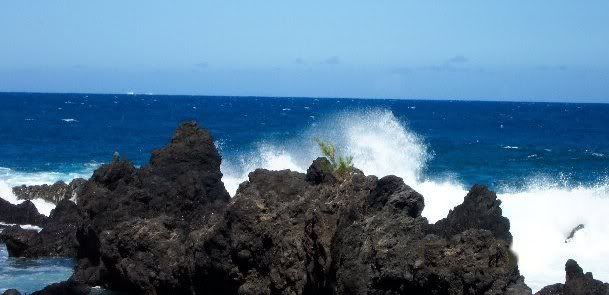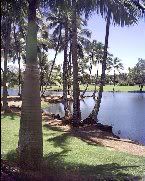

Name~ Hokule'a Kealoha
Short Bio~Hokule'a Kealoha is the Nom De Plume of a writer that formerly lived in Hawaii and is now living a life of adventure on the highways and byways of the American South . I am a Born Again follower of Jesus, as well as a wife, mother of cats and dogs,jeweler, entreprenuer, photographer and pilgrim...
Age~ Old enough to know better
Status~ Newly Single after 13 years of marriage,fur mom to the loving and devoted mini ShihTzu doggie Annabelle, born 6-11-2007 RIP 2-25-09, and the beautiful Abigail born 2-14-09
Hair Color~ natural brown/grey
Mood~ I ALWAYS have a mood, try me...
Loving~ Jesus, Hawaii, my furry friend, Abigail, my Pen Pals, Jewelry ,Blogging ,Writing anything,my Ipod,and being outdoors surrounded by my wonderful natural surroundings
Hating~ Boom Box Cars, Earspray, Abuse of Power,
Reading~
Bible
Magnificat
Link
Link
Underwired! Louisville's magazine for Women
In Store~The Magazine for the American Jeweler
Books in Progress...
CATECHISM OF THE CATHOLIC CHURCH
"Link"
"Link"
Just Finished Reading
"Link"
Link
Link
Link
Jesus, Divine Mercy ~

I Trust In You~
My Favorite Past Posts~Relive The Journey!~
2009~
Link
Link
Link
Link
Link
Link
Link
Link
2008~
Be Thankful
Colateral Damage
Make Lemonade
Home Is Where The Heart Is
The Poor With Us
Because Its The Hardest Thing I Can Do
We Have All Become Victims
Lest I Forget
The Most Important Words
Family Values
Familiar Places
May Perpetual Light Shine On Them
A City In Motion
2007~
The Quiet Storm
Fellowship of the Cane
Like Dead Unremembered: A 9-11 Tribute
The Medicine Machine
One Giant Leap
In The Steps of St. Francis
Too Much Information
The Un Choice
2006~
The Holly and the Ivy
The First 9-11, Dec 7,1941
Small Moments of Silence
Peaches to Winnipeg
Dreaming of Hawaii
Memorial Day
Scattered Values
The White Line is the Lifeline for the Nation
Warnings of a New Civil War
I Will Be True To The Promise I Have Made
The Snowy Bloody Day
Cats in the Cradle
2005~
The Journey
Rebirth of a City
For Posterity's Sake
The New Civil War
Every Mother's Son
And There You Stayed, Temporarily Lost at Sea
The Lone Rider
The Bible Is Not the Fourth Member of the Trinity
Rome Wasn't Built With Union Labor
Happy Birthday Mom ~revised~
A Beautiful Noise
Even Now
The Wearing of the Red
Night Ranger
The Joyful Traveler
Hoiliili "To Gather Up"
Ke Makakilo (My Observations)
He Giveth Sleep
Save The Children
2004~
Lux Aeterna
December 2004
You're Joking, Right?
Ground Zero
I Am Not A Failure
O,To Grace, How Great A Debtor
Lost In Translation
One Small Step for Man
The Rainbow's End
Profanity
Taps
The Journey
Makoa's Song
No Aloha For The Weakest
The Paradoxical Comandments
The Time Is Now
2003~
When No Fruit Is On The Vine


St. Edith Stein~Pray for Us
Religion Link List~
My Secret is Mine
Ignatius Insight-Online Magazine
Fr John Corapi SOLT
Dr. Scott Hahn St Paul Center
Fr. Mitch Pacwa~ Ignatius Productions
Link
Link
Link
Link
Link
Political Link List~
Link
Link
Link
link
Arkansas Link List~
Little Portion Hermitage
John Michael Talbot website
John Michael Talbot Myspace page
1st United Methodist Church Bella Vista
Northwest Arkansas Guide
Mimi's Cafe
Metro Woman Business Directory of NW Arkansas
River Grille
Link
Link
Link
Interactive Links~
Live WebCam Feed from the Mauna Lani Resort, Kohalla, Big Island of Hawaii
Click here for Aloha Joe!Live Hawaiian Music 24/7
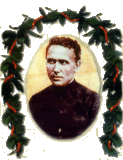
St. Damien of Molokai'i, Patron of Hawaii and the Outcasts among us, pray for us....

Hawaii Links~ ~
For more Hawaii links Click Here
Volcano Updates (Pele's Mood Meter)Hawaii Volcano Observatory
Hawaii Volcanoes National Park
Volcano Watch Archives
Mauna Kea Observatory
Pacific Tsunami Museum
Link
Link
Link
Link
Technorotica for Blogging~




Who Links Here...Click here to see who's linking to this site. Powered by WhoLinksToMe.com
Globe of Blogs~Blog search engine
The Blog Search Engine
stock xchng
Photobucket
BlogSkins
Link
Wikipedia
Nuzio's Place on the Web
Commutefaster.com
PING ME!
MWBS Wordpress Edition
Link
Technorotica for Jewelers, and the Jewelry Trade~
Gemological Institute of America
The Drouhard National Jewelers School
The Conner School
Link
Link
|
August 31, 2004
The High Road To Mauna Loa
 The High Road to Mauna Loa. Mauna Kea looms beyond the fantastic landscape of a Mauna Loa lava flow. It looks like fast-moving pahoehoe rolled hunks of a'a in front of it, coating the boulders with more and more lava, like a snowball rolling downhill. The lava balls ended up looking like black pearls in a volcanic oyster shell. ALAN D. McNARIE/Tribune-Herald
Taking the high road
Monday, August 30, 2004 11:21 AM HST
The route up Mauna Loa is an adventure
By ALAN D. McNARIE
Tribune-Herald correspondent
The one-lane strip of crumbling asphalt that branches off the Saddle Road at Pu'u Huluhulu doesn't look impressive. But Mauna Loa Observatory Road goes to impressive heights -- to 1l,141 feet, to be exact -- making it the second highest continuously paved passenger vehicle road in the state, after the road up Haleakala on Maui. Along the way, the road passes through some of the wildest, most desolate landscape this side of Antarctica.
The observatory road -- named for the National Oceanic and Atmospheric Administration's Mauna Loa Observatory at its end -- may also be one of the easiest 11,000-foot ascents on the planet. It isn't a typical mountain road. There are no hairpin turns, no zig-zags, no sheer precipices with 1,000-foot drop-offs. That's because of the nature of the mountain that the road is ascending.
Mauna Loa isn't the highest volcano on earth, but at over 70 miles long and 13,677 feet tall, it is the largest in sheer volume. Most of that rock has flowed outward on the broad volcanic shield that surrounds the volcano's gigantic summit rift -- its famous "curtain of fire" -- making a relatively gentle slope. In general, Mauna Loa Observatory Road is perhaps a little less steep and curvy than some sections of Saddle Road.
But drivers must be cautious. Jagged a'a lava extends to within inches of the pavement. High winds and yes, snowstorms, can arise suddenly on the road's upper reaches. And the altitude makes this no place for a person with heart or lung problems (or a car with cooling system problems). Some people develop altitude sickness, with symptoms ranging from headaches and dizziness to gut-wrenching nausea. It's a good idea to take along water and snack food. Oddly enough, one way to reduce the chance of altitude-induced nausea is to keep a little food in one's stomach.
The first three or four miles, crossing the lava plain, are actually the roughest. The pavement is well on its way to becoming a Jeep trail. Some of the potholes extend more than halfway across the road--though all are fairly shallow, since the pavement itself is thin and there's nothing but lava underneath.
The damage on this stretch is probably because of the heavy traffic -- heavy not so much in terms of numbers, but of weight. Several unpaved or gravel roads take off on the right, leading to the U.S. Army's Pohakuloa Training Area. (Those roads are tempting, but you could end up dodging artillery shells or confronting MPs.) The road also crosses a scraggly kipuka (an area of older lava and trees surrounded by newer lava) that draws occasional hunters, and you may encounter a telephone service truck headed to the relay towers eight miles up the road.
This is a genuine one-lane road, despite the little squiggly line of paint that some waggish person dribbled along the road's center. Meeting a Humvee full of National Guardsmen or a pickup full of dogs is an instant exercise in geometric calculation and unspoken diplomacy. The general rule is that the uphill vehicle has the right of way, but as a practical matter, the first vehicle that reaches a spot wide enough to pull over is the one that yields.
As a matter of courtesy, the driver who gets to proceed past usually waves or shakas the driver who stops, even if he/she is a perfect stranger, and the waiting driver then waves or shakas back. One-lane roads foster this sort of camaraderie.
There are some points where the road passes over a hummock or curves between high walls of a'a that block the view ahead. Some drivers honk when they reach such points, just in case someone 's approaching from the other side. Some slow down to give themselves more time to react. Others just take their chances.
Fortunately, chances are excellent there isn't anyone headed your way. After the first four or five miles, the last tree disappears, and not even the hunters have a reason to come up here. On a weekday, a driver may meet only three or four vehicles during the entire trip.
The road's condition up here also improves greatly. The topmost few miles even have a fresh coat of asphalt.
At the road's end are three things: the meteorological observatory, the Mauna Loa Summit Trailhead, and one stupendous view.
The observatory has no fences or "No Trespassing" signs, but it's not a tourist attraction. There is no visitors' center, no interpretive signs, and no tours -- though, according to the observatory's Web site, http://www.mlo.noaa.gov, "special arrangements can be made to visit the observatory by contacting station chief John Barnes at 933-6965 or by e-mailing John.E.Barnes@noaa.gov." The Web site, however, is a great place to learn about the observatory and its cutting-edge experiments.
The telescopes on Mauna Loa are puny compared to the monsters on Mauna Kea. That simply reflects the observatory's different purpose. Many of the Mauna Kea scopes are designed to peer to the farthest ends of the universe. But the Mauna Loa Observatory studies not the stars but earth's atmosphere. It has been recording climactic changes for half a century. The observatory's telescopes are used mostly to observe the sun, whose sunspots and solar flares have a direct impact on Earth's weather.
There are also instruments to measure atmospheric gases, from ozone to hydrogen sulfide to gaseous mercury. There are anemometers to measure wind speed, and nephelometers to measure the rate at which light is scattered by aerosols (tiny particles of liquid suspended in the atmosphere, such as the water droplets that make up clouds). There is even an experiment that collects the cosmic dust that drifts down through the thin atmosphere to the mountain.
The only "public" area at the observatory itself, however, is a the public parking lot which holds about four or five vehicles. The observatory's five small telescope domes and platforms full of meteorological instruments are easily visible, uphill from the parking lot, which is probably about as close as the scientists would care for you to come.
The real view, though, is in the opposite direction. This is one of the few spots on the island where, on a clear day, you can get out of a car and see both the east and west sides of the island at the same time. You often can see the top of Maui's Haleakala as well. Yet what really dominates the scene is Mauna Kea, whose summit is about 20 miles away as the crow flies (though no bird would deliberately fly that high). From here, the giant telescopes atop Mauna Loa's sister mountain are simply white dots.
The public parking lot also provides parking for sturdy souls who come to challenge the Mauna Loa Summit Trail, which climbs six more miles and 2,536 in altitude to the mountaintop. The distance to the summit from this side of the mountain is less than half that from the trailhead on the Mauna Loa Strip Road in Hawaii Volcanoes National Park. But it's also much more strenuous. Don't attempt it unless you're physically fit, hiking with a companion, and well equipped. It's possible -- but not advisable -- to hike to the summit and back in a day. It would be much better to spend the night at the Summit Cabin.
But there's another hiking route that's possible from this point, and is much easier: the road itself.
Na Ala Hele, the program that maps and manages the state's trail management system, lists the Mauna Loa Observatory Road as a multiple-use trail: suitable for not just for motor vehicles, but also for bicycles and pedestrians. One of the best ways to experience the full impact of this alien landscape is to take two vehicles up the Saddle Road, park one at Pu'u Huluhulu, and take the other to the road's top, then bicycle or walk down. Seventeen miles seems like a long hike -- but if you start fairly early and go at a steady pace, you can be back down at Pu'u Huluhulu by 4:30 p.m. For the less adventurous, the hike can be as short as a few hundred yards or as long as half a day -- just remember that it will be much harder climbing back up.
This barren mountain is the place to discover both the vastness and the diversity of lava. Mauna Loa erupts much less frequently than Kilauea does, but when it does, the volume of melted stone that pours out is exponentially larger. There are flows up here that dwarf the mighty river of frozen lava from Mauna Ulu in Hawaii Volcanoes National Park. And a'a flows -- the jagged, clinkery type of lava -- seem to be much more common on Mauna Loa; some of these flows stretch for miles. The road runs into the heart of a vast, stark wonderland of improbable shapes and colors.
Lava isn't just black. For that matter, it turns out almost never to be black, if you look closely enough. Its blackness is composed of every color of the rainbow. Especially around the throats of old vents, the lava takes on a fantastic palette of reds, yellows, browns and ochres -- even hues very akin to purple, or at least red-purple. Bits of foamy scoria roll in the wind, winking and sparkling with the multi-hued iridescence of an oil slick. Massive veins of dense, charcoal-gray basalt -- the weapons-grade material of the Stone Age -- jut up through lighter, browner rock, inches from pockets of red-orange cinder.
Even more fantastic than the colors are the forms. Lava is chaos theory in action. Even a simple bit of a'a is such a jagged, intricate complex of curves and angles that it's impossible to describe its shape -- yet it's instantly recognizable. On the other hand, the smoother, shinier pahoehoe readily suggests other forms -- rope, pillows, brownie mix.
Sometimes the fluid chaos of pahoehoe collides with the crackly chaos of a'a to create weird forms. At one spot along the road, a fast-moving pahoehoe flow apparently rolled huge hunks of a'a in front of it, coating the boulders with more and more lava, much like a snowball rolling downhill. When the lava balls finally stopped, the lava flowed on past, leaving them shining, giant black pearls half-embedded in a volcanic oyster shell.
But perhaps the most fantastic aspect of this vast landscape is the silence. Sometimes there is the distant grinding of a vehicle laboring up the road, or the thrumming of a helicopter below -- yes, this is a place where you can literally look down on helicopters -- or the faint crump of artillery at Pohakuloa. But more often, there's nothing but the soughing of wind across the lava. There are no birdsongs this high. There is seldom even the buzzing of a flying insect.
But there is life here. If you walk long enough, you'll probably see a wolf spider scamper across the road. Wolf spiders are top predators of the insect world. They have to be eating something. Maybe it's stray insects, blown up here by the relentless trade wind. Or maybe there's a whole subterranean mini-ecosystem, clinging in the sun-warmed zone of cracks and mazes and pockets just under the surface of the a'a.
What does a wolf spider eat at 11,000 feet? Mauna Loa may be one of the most intensively studied mountains in the world. Its surface is laced with seismometer stations that listen to the movements of lava and fault lines miles underground. Tilt detectors dot its skin to measure the inflation and deflation of its crust. Mauna Loa Observatory's instruments detect the gases emitted as it breathes. Biologists capture new species of fruit flies at isolated kipukas. But there are always more surprises, more questions to be asked.
I have been up there when we had a pick up and were a bit more adventurous. I am still recovering from mu little adventure and my feet are so bruised they look like I have been stomping grapes. Uggh. More tomorrow
|
|








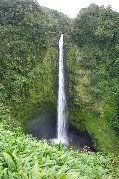







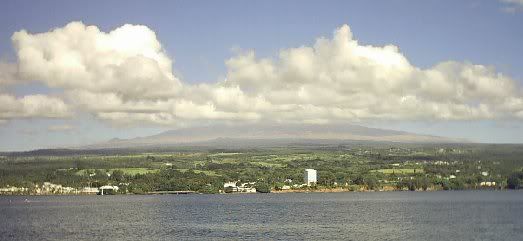
 based on design by mela
based on design by mela